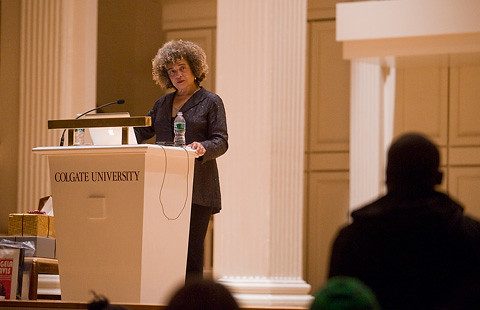The ˛Řľ«¸ó campus Tuesday night hosted a key and sometimes controversial figure of the civil rights movement, Angela Davis, who urged students to reconsider how they view black history.
A university professor and activist for civil rights, prison reform, and political accountability, Davis was brought to ˛Řľ«¸ó by Sisters of the Round Table (SORT).
“In celebration of Black History Month our organization thought it was important to bring a speaker that highlights the contributions of black women,” said Gabriella Jones-Casey ’09, chairwoman of SORT.
Davis approached the celebration of Black History Month in a dynamic way that seemed to strike a chord with students.
“I really liked how she discussed the evolution of Black History Month in the context of the current political situation – the election of Obama, the war in Afghanistan, and the role of modern feminism,” said Sam Shea ’09.
 |
| Angela Davis answers a question during her appearance at Memorial Chapel on Tuesday night. (Photo by Luke Connolly ’09) |
Davis noted that our society often thinks of history as being made by individuals and Black History Month is celebrated as a collection of individual narratives.
But she noted that change is forged by communities. The individuals we celebrate are those who identified or aligned themselves with a larger community that was already struggling for justice.
Davis pointed to the anonymous women celebrated in Jo Ann Robinson’s memoir The Montgomery Boycott and the Women Who Started It. It was the women of Montgomery who organized the boycott against the bus company, and the boycott succeeded because it was the women of Montgomery who refused to ride the bus.
She emphasized that it is ordinary working people who can make a difference.
Davis, who was acquitted of murder and kidnapping charges after a 1972 trial that gained widespread notoriety, said race is central to the socio-historical circumstances of the country.
She noted that there has not been the opportunity to have honest discussions about race in America.
“We do not know how to talk about race. And we assume the only way to deal with race and racism is to ignore it,” she said.
During this Black History Month, Davis encouraged students to engage in open conversations about race on campus and to think of history in a different way. To think of the people whose names cannot be recalled. A history made by ordinary individuals who imagined a better time, a time of hope, because that is what the celebration of Black History Month is all about.